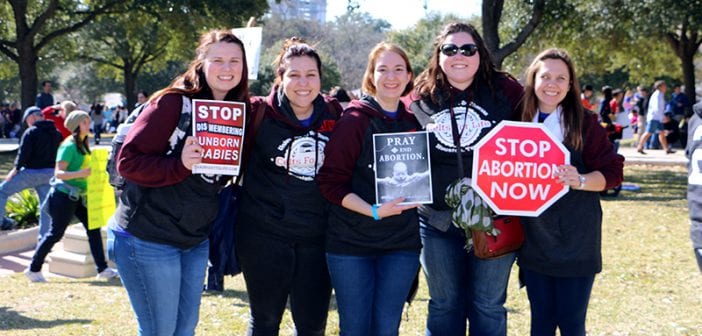In recent years, Pro-Lifers have faced increasingly sophisticated opposition from abortion activists. Particularly offensive to the anti-Life crowd are the peaceful and lawful Pro-Life protests outside abortion clinics. Anti-Life legislators in the state of Massachusetts went so far as to pass a law banning Pro-Lifers from standing on public roads and sidewalks within 35 feet of an abortion mill. Pro-Life groups challenged the law, and, in 2014, the Supreme Court ruled unanimously in McCullen v. Coakley that the law was unconstitutional. The ruling did not affect the High Court’s previous ruling in favor of a Colorado law that instituted an 8-foot zone around abortion mills.
Several states and municipalities, at the bidding of the abortion lobby, have tried to pass similar “buffer zone” laws to silence Pro-Lifers. The decisive ruling against the Massachusetts law forced local governments to acknowledge that an absurd 35-foot buffer zone directly undermines Pro-Lifer’s First Amendment rights to approach abortion-minded women on public sidewalks. The 8-foot buffer zone, seen as a reasonable compromise by anti-Lifers, still inhibits the ability of Pro-Life sidewalk counselors to offer mothers considering abortion information about their options and resources available. Most recently, the city of St. Louis began considering a buffer zone barring Pro-Lifers from the front of the state’s last remaining abortion mill. As Kristin Wilmes, director of St. Louis Coalition for Life, explained, “This bill would be a barrier to education.”
On a recent Saturday in Charlotte, North Carolina, another form of intimidation was at play. The Pro-Life group Love Life Charlotte organized a peaceful and prayerful protest at an abortion mill, Preferred Women’s Health Center of Charlotte. A representative of Love Life Charlotte said in a video promoting the event that this is “the busiest abortion clinic in the Southeast.” The prayerful protest highlighted the role fathers play in the tragedy of abortion and offered alternatives and love to women seeking elective abortions. Footage of the event shows an orderly crowd with hundreds of men and their families.
The response from anti-Life media has been explosive. Anti-Life media accused Love Life Charlotte of using “shaming tactics” and harassing women. The abortion mill’s administrator, Calla Hales, described the event as raucous and claimed protestors sang what the News & Observer called “explicit songs about life in the womb.” These reactions, while clearly exaggerated and out of proportion to the peaceful event that took place, are nothing more than the assessment of anti-Life activists.
Unfortunately, Hales insinuated that the city mistakenly issued the permit for the Pro-Life event. Hales told the New & Observer that the city issued the permit incorrectly, because to her knowledge the permit was not issued 30 days in advance. A spokesperson for the Charlotte Department of Transportation said in an email to the News & Observer that an ordinance allows the city to waive the 30-day requirement. All parties agree that Love Life Charlotte received the appropriate permit and conducted a peaceful protest. Hales’ seemingly unfounded suggestion that anything illegal or inappropriate took place is a brazen attempt to discredit the Pro-Life group.
The right to peacefully protest and offer sidewalk counseling is a cornerstone of the Pro-Life movement—and a right protected under the First Amendment. In many ways, the public thoroughfares leading to America’s abortion mills are the frontlines of the Pro-Life cause. Earlier this year, a Houston man, Jonathan Davidson, won a victory for the Pro-Life movement when the Fifth Circuit Court of Appeals ruled that he was wrongly arrested for peacefully praying and counseling outside a Houston-area Planned Parenthood. Cases like Jonathan’s underscore the importance of Pro-Lifers speaking up for their rights in the face of opposition. If the Charlotte abortion mill attempts legal action, we expect Love Life Charlotte will do just that. We wish them the best in their continued efforts to spread the Culture of Life through peaceful and prayerful protest.



